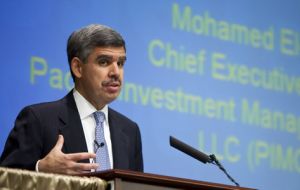MercoPress. South Atlantic News Agency
Large sovereign bond trader adheres to Germany’s “hair-cut” proposal
 Mohamed El-Erian, CEO of Pimco, with investments worth 1.3 trillion US dollars
Mohamed El-Erian, CEO of Pimco, with investments worth 1.3 trillion US dollars One of the world's largest private buyers of government bonds says the private sector should bear some of the cost of financial rescues such as for the Irish Republic. The comments came from Mohamed El-Erian, chief executive of Pimco, which holds investments worth 1.3 trillion US dollars (equivalent to 80% of Brazil's GDP).
“It is unreasonable to expect the Irish taxpayer... to bear all the costs,” he told the BBC World Service. Ireland has unveiled tough budget cuts and is negotiating a bail-out.
It is expected to get a package of support worth 85 billion Euros from the International Monetary Fund and fellow European Union members.
Mr El-Erian said it was unfair for the Irish people to pay for the cost of the banks “basically being taken over by the government”.
”Our assessment.... has been that you need a broader burden sharing that also involves the European Union, the IMF and private creditors (‘hair-cuts’),“ he told World Business News on BBC World Service radio.
The Pimco boss's reference to private creditors will be seen as highly significant given recent events on the financial markets.
The sell-off of Irish government bonds that forced the country to accept the multi-billion Euro package of emergency loans, is widely believed to have been prompted by concerns that bondholders would be required to take losses on their investments if the country defaulted on debts.
In her latest comments, on Wednesday, German Chancellor Angela Merkel said that European politicians needed the courage to make private investors share in the risk of future debt crises.
Many bondholders have sold their investments precisely to avoid this scenario, which has made the position of vulnerable countries like the Republic of Ireland and Portugal even more precarious.
Mr El-Erian's remarks suggest that some investors recognise the need for compromise.
”It is in the long-term interests [of private investors] to work towards a pre-emptive orderly restructuring of debt that is consistent with high growth,“ he said, suggesting that private investors should bear their share of the pain.
He believes crises should be dealt with over three stages. First is recognising the problem, then comes calming the markets and finally there is dealing with the underlying issue.
In his view, the Irish Republic is at stage two, as is Greece, which accepted an EU-led rescue six months ago. But he claims there is an important difference between the two nations: as Mr El-Erian sees it: ”Greece's bail-out hasn't worked”.




Top Comments
Disclaimer & comment rulesCommenting for this story is now closed.
If you have a Facebook account, become a fan and comment on our Facebook Page!